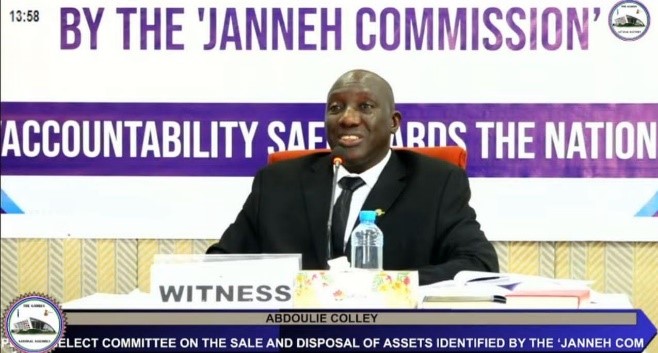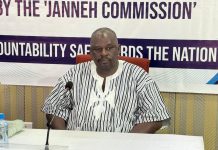By Kebba AF Touray
In his appearance before the National Assembly’s Special Select Committee investigating the assets of former President Yahya Jammeh, Registrar General Abdoulie Colley admitted on Wednesday that he had never seen the key High Court order that vested control of Jammeh’s properties in his office — even after years at the helm of the department.
Colley, who has served as acting Registrar General since December 2018 and was confirmed in May 2021, appeared before lawmakers on July 23 to give testimony on the role his office played in managing assets seized from Jammeh following the 2017 change of government.
Kah, leading the questioning for the committee, requested an overview of the department’s mandate. Colley responded, “The Registrar General is responsible for three units. One is civil marriage. The second one is industrial property, and the third one is deeds.” He elaborated that the industrial property unit handles patents, trademarks, and designs; the marriage unit oversees civil marriages and the issuance of bachelor’s certificates; while the deeds unit deals with all registered property deeds.
Counsel Kah then turned to the central issue: the 2017 High Court order issued before establishing the Janneh Commission of Inquiry, which froze Jammeh’s assets and vested control of them in the Registrar General.
“Have you ever come across this order?” she asked.
“No, I have not,” Colley replied.
“You’ve never seen this order?” Kah pressed.
“No,” he repeated.
However, Colley said he had heard of the order in discussions at the Ministry of Justice, particularly when he and other staff were tasked with compiling documents relating to the investigation. “That’s when I came into the process,” he said.
Asked which department he worked in then, he confirmed, “I have been at the Registrar Department throughout my service in the Ministry.”
Kah handed him a copy of the order, marked “MOJ 5A,” and asked him to read paragraph two aloud. It stated that the “custody and control of all movable and immovable properties held by or in the possession or control of the respondent, his associates, and family members… be granted to the Registrar General.”
Colley confirmed that he had participated in compiling a list of properties before the Janneh Commission, though he could not provide a copy or indicate how many assets were involved. “I don’t have the record with me now because it was teamwork,” he said. “I was asked to work with other colleagues to compile a list of properties that were sold, maybe by the sheriff, and then other properties that were entrusted to the receiver.”
When asked for details, Colley said, “I cannot tell the number of properties unless I have the record before me. And I was not the author.”
“You took part in compiling this document?” Kah asked.
“Yes,” Colley replied. “In fact, I supervised it, but eventually, along the line, I had to leave.”
“You had to leave where?” she asked.
“For other engagement,” Colley responded, without elaborating.
Kah then turned to his preparation for the inquiry. “When you received summons from the committee to give a statement and to testify, didn’t you deem it necessary to gather all documents related to the work of this committee and the Janneh Commission for your department?”
“No,” Colley replied. “This task was under the purview of the Solicitor General.”
Asked whether he would be able to identify a list of Jammeh’s properties submitted to the High Court and Janneh Commission, Colley said, “No.”
“What exactly did you supervise in detail?” Kah asked.
Colley said his role involved helping the Solicitor General compile a list of properties “that were sold by government or the commission,” adding, “this was in preparation for this hearing.”
Referencing paragraph two of the court order, Kah reminded him that all assets seized from the former president were to be placed under the control of the Registrar General.
Colley confirmed this, but noted, “At the time, I was not the Registrar General.”
He was then asked to list the assets known to be vested in the Registrar General’s control. “The list speaks for itself,” he said. “But as far as the order is concerned, I am talking about movable properties.”
Colley listed some of these assets as “lands, bank accounts, projects and school accounts operated and controlled by the former president, foundation accounts, also accounts, dollar accounts, accounts with Skye Bank, dollar account, euro account, account with GTB, account with Zenith, among others.”
Kah asked, “To the best of your knowledge, Mr. Colley, what measures did the Registrar General’s Department at the time take to enforce or execute this court order?”
“I was part of the office,” Colley answered, “but I was not involved in direct administration of the properties.”
He added, “As far as these issues are concerned, there is no file that I took over, that I inherited when I became Registrar. I have not come across any file detailing these properties.”
Kah asked if, after becoming Acting Registrar General in 2018, he had ever attempted to locate such information. Colley said no.
“In fact, what happened was my predecessor was still with us in the office,” he explained. “He was moved from Acting Registrar General to Acting Registrar of Companies. So when he was moved, he went with the files and continued to take possession of whatever properties were vested to the Registrar General.”



















